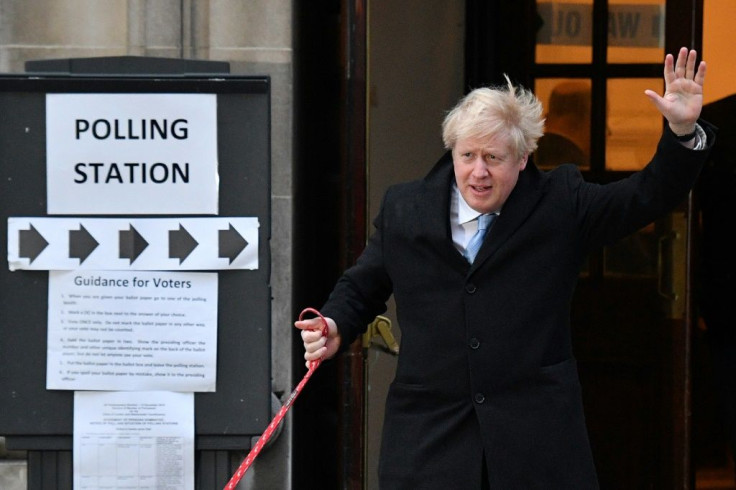U.K. Business Leaders Hail Boris Johnson’s Victory, Want Quick Movement On Trade Deals

Britain’s business community celebrated Boris Johnson’s resounding victory in the U.K. general election and now are urging him to quickly move on making new trade deals with the European Union for a post-Brexit world.
The FTSE-100 index and the pound sterling soared on Friday morning in the wake of Johnson’s triumph.
Iain Tait, a partner at London & Capital, a global wealth and asset manager, said Johnson’s emphatic win showed that “the Labour Party’s economic model has been rejected completely. The spirit of wealth creation and low tax resonates across this country.”
Tait added investors and financial markets “welcome this result” and “a more stable political backdrop will also increase the attractiveness of U.K. assets for international investors, many of whom may have viewed the U.K. as un-investable in recent years.”
Charles Michel, the president of the European Council, congratulated Johnson on his victory and suggested the European Union wants to make a fair trade pact with London.
"We will negotiate a future trade deal which ensures a true level playing field," Michel tweeted.
However, many U.K. business leaders, most of whom had opposed Britain’s departure from the European Union, want Johnson to act immediately to shore up the economy and strengthen confidence.
Carolyn Fairbairn, director general of the Confederation of British Industry, a business lobby group, said: “early reassurance on Brexit will be vital. Firms will continue to do all they can to prepare for Brexit, but will want to know they won’t face another no deal cliff-edge next year.”
Fairbairn told BBC radio Friday morning that “the fact that we have a prime minister with a very strong mandate to govern is welcome. But there’s a question as to how that [mandate] is used. The real work starts now.”
Britain’s manufacturing sector has been weak as the Brexit saga has dragged on. Total industrial output dropped by 1.3% in October.
Stephen Phipson, the chief executive of Make U.K. , a manufacturers' organization, said Johnson's first job "is the urgent need to begin negotiations on our future trading relationship with Europe, cementing frictionless trade, access to key skills, regulatory alignment and space for business to prepare for new arrangements.”
Phipson added manufacturing exports “are one of the powerhouses of our economy and we must allow them to flourish."
The services industries -- including the retail sector, the financial sector, the public sector, business administration, leisure and cultural activities -- account for an overwhelming majority of British economic output.
Miles Celic, chief executive of TheCityUK, a private-sector industry advocacy group, said with a January Brexit now all but certain, “both sides [Britain and Europe] must move quickly to prepare for the next stage of the negotiations.
"The first phase has been dominated by the impact on goods. This has neglected the 80% of the U.K. economy made up of Britain’s world leading services industries. Ministers should seek to rectify this, consult widely, and focus their efforts on how the U.K.’s global leadership in services industries like ours can be sustained and enhanced over the course of this Parliament.”
Britain’s all important retail sector, which employs some 3 million people and which has witnessed store closures across the country, implored Johnson to support the industry.
Helen Dickinson, chief executive of the British Retail Consortium, said the prime minister must now “fulfil his manifesto pledge” and help save retail through “a fundamental review into the broken business rates system to relieve the burden on retail businesses.”
Dickson added it’s vital that the government “commits to bringing clarity on the U.K.’s future relationship with the EU and pursues a fair deal for consumers that maintains tariff-free, frictionless trade with the EU.”
Other business leaders asked Johnson to provide detail and clarity in his upcoming trade and financial initiatives.
Jonathan Geldart, director general of the Institute of Directors, an organization for company directors and senior business leaders, said Johnson “must resist the urge for arbitrary negotiating deadlines, and should commit to a proper adjustment period that starts when businesses know the full detail of what changes they may be facing. Our members have made clear that the content and shape of any new deal are much more important than simply the speed in getting there.”
Adam Marshall, director general of the British Chambers of Commerce said Johnson must also restore business confidence. The Times recently reported that U.K. business confidence has recovered to its highest levels since January because of “growing optimism about the outlook for the economy and the prospect of Brexit clarity.”
But Marshall said campaign slogans must give way to a renewed focus on the details that matter.
“Our business communities need to see swift, decisive action to avoid a messy and disorderly exit from the EU and to tackle the barriers holding back investment and growth here in the U.K.,” he said.
On the whole, financial markets and the business community are quite happy with Johnson – at least for now.
“The market is now pricing in some certainty about U.K, politics but, more importantly, some certainty about Brexit,” said Seema Shah, chief strategist at Principal Global Investors. “This should be a path to a stronger economy, at least in the short term.”
© Copyright IBTimes 2024. All rights reserved.




















